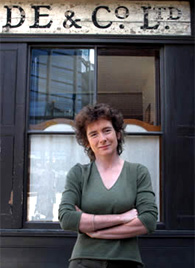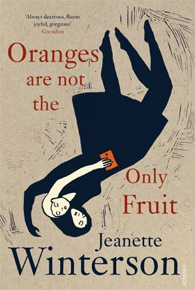British author Jeanette Winterson offered an entire generation of women a book that fired their imagination when it was published in 1985 in the West and she is now captivating a new audience of readers behind the iron curtain in Communist China. Hundreds lined up to hear her speak through translators and for an autograph at the Shanghai Book Fair which runs from August 17-23.


Oranges are not the Only Fruit, believed to be semi-autobiographical and written when she was 24, was a most talked about coming of age novel for gay women. It is about a girl who grows up in an English Pentecostal community. Her mother’s religious friends are against homosexuality and subject the character Jeanette to exorcisms. The book is now popular in schools, mostly on the A-level literature reading list.
Her subsequent novels, including Sexing the Cherry (1989) and The Passion (1987), explore the boundaries of physicality and the imagination, gender polarities and sexual identities, and has won Winterson several literary awards.
"When I was 16, I fell in love with a woman, which was a disaster. My stepmother was sure I had sold my soul to the devil. I either had to stop loving the girl or leave home,” she told an audience of largely young readers. “Sometimes when you’re given a very simple choice, you know what to do. But what you don’t know is that it shakes your life."
Winterson said her adopted mother asked her, 'Why be happy when you can be normal?' And that would be the sentence Winterson would work with for the rest of her life.
And that also is the title of her next book which will be published by Jonathan Cape in October. The poet and journalist will go on to Dalian and Bejing next on a three-city book tour in advance of the book’s launch.
When Winterson began writing Oranges are not the Only Fruit she had an idea that she could search for self-identity in books. She explored questions ranging from relationships and unsustainable love and passion to the discomfort that many women have with sexuality and their physical body. The book won the prestigious Whitbread prize and was later adapted into a TV series.
“For women it is difficult to go on being sexual because we are so nervous about our bodies. So we feel fine so long as someone desires us, otherwise we feel terrible… it doesn’t matter how rich we are, all of us want to find love and all of us want to give love. That should be able to happen in a way that includes desire, passion, eroticism.”
Her book Written on the Body (1992) is for anybody who has ever felt despair about love, she says. But Winterson no longer holds the same bleak view about love as she did when writing some of her early books. "Things change and writers change and it’s always a bit strange to meet your own books 20 years later. It’s like meeting someone you’ve been in love with but haven’t seen in a very long time."
One of the underlying beliefs she had then was that passion was always destructive. The books remain but the author has moved on. "As I have grown older, I have become more interested in how passion and love survive rather than how they are destroyed and how they destroy you, which doesn’t mean I believe less in love… I do believe that love is our greatest challenge and our best chance."
Her books are about changing one’s life by changing one’s self. Change is always harder than standing still and remaining rooted in old habits and ideas. "I no longer believe that (love) has to happen in a kind of destructive force. I’m now sure that for all its destruction and difficulties, love is a positive force."
During the question and answer session, Winterson was asked about her views on religion and homosexuality and if she realised that China remained a closed society and that being gay was still taboo.
She turned the question inside out by asking if her audience was worried about homosexuality and the response from the 150-large audience was a resounding “no.”
A show of hands found no one was worried about homosexuality to which she quipped: “China is a very liberal country.” Contemplating the question further, Winterson said: "Well, we are not so great in the West."
"The more love we can get on the planet, the better. So I don’t care who loves who, just that we love each other. I know that the world in my books seems foreign in the East… but that is one of the challenges."
The sexual awakening of same-sex a generation ago who read Winterson’s books are only beginning to stir now in China, a country where many remain firmly in the closet or unaware of their choices. A bespectacled young woman in the audience said many females in China were close friends and asked how one should distinguish platonic from sexual love.
“I’m a bit baffled by that question because I think you can tell. Usually, we are not in bed with our best friends. I think that is a very practical test you can apply,” she said, to much laughter and applause.
The week-long Shanghai Book Fair ends Aug 23. Winterson joins other leading international and local writers including Brooklyn author Colm Toibin, the French Nobel Laureate in Literature Jean-Marie Gustave Le Clezio and the Jiangsu-born 2010 Man Asian Literary Prize winner Bi Feiyu at the literary event.
J.W. Ken is a poet and freelance journalist who travels the globe writing, and is now in Shanghai.











 Printable Version
Printable Version










Reader's Comments
Why be "normal" when you can be happy!
I have been a fan of Jeanette Winterson's since the early 1990s.
I recommend "Oranges are not the Only Fruit" for those just coming out and "Written on the Body" for those who have been in love, are in love or plan to be in love :-).
Peace.
stop being biased and prejudied!!!!
and, what a big deal a lesbian writer debut in china?? i suppose there were so many other gays and lesbians doing outstanding matters in china before...
Please log in to use this feature.